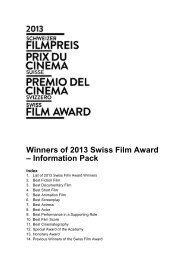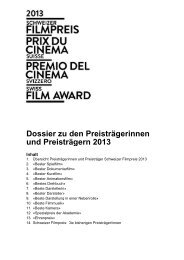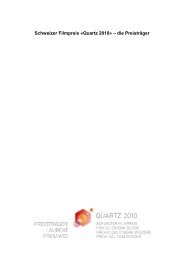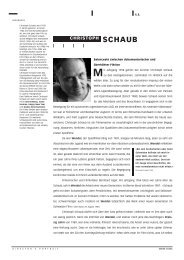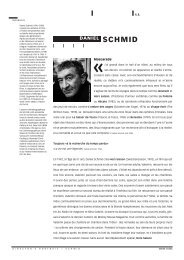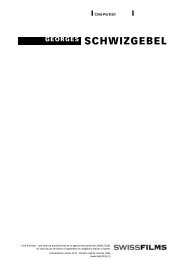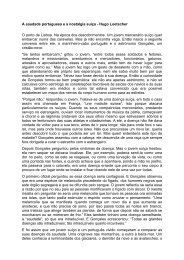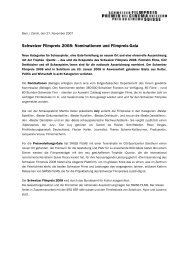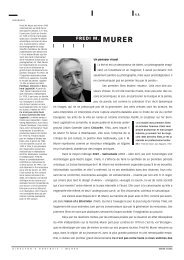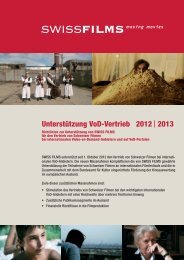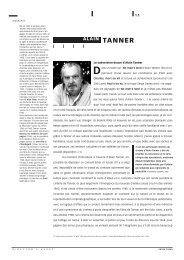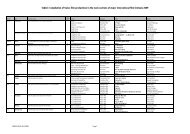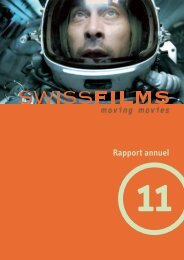Director's Portrait Fredi M. Murer - Swiss Films
Director's Portrait Fredi M. Murer - Swiss Films
Director's Portrait Fredi M. Murer - Swiss Films
Create successful ePaper yourself
Turn your PDF publications into a flip-book with our unique Google optimized e-Paper software.
D I R E C T O R ’ S P O R T R A I T<br />
> Seven questions to <strong>Fredi</strong> M. <strong>Murer</strong><br />
was a complete waste of time. When I was a young film-maker living in Zurich, almost all my closest<br />
friends were poets, sculptors, musicians or painters, and they populated my early films as protago-<br />
nists. These rather experimental films were always a kind of “portrait of the artist”, although not<br />
in the conventional sense. Rather, they were creative duels between me behind the camera and<br />
them in front of the camera, and we were always very careful to keep the line between documen-<br />
tary and fiction fluid.<br />
Getting back to the original question, what has always fascinated me so much about the<br />
film medium is the blurred line between reality and invention, in other words the creative handling<br />
of art and artificiality: we sit in a cinema, staring at an artificially created image on the white screen<br />
and shedding real tears. Admittedly, that has a lot to do with the creativity and imagination of the<br />
viewer, too.<br />
Your films frequently contain utopian scenarios that hint at pessimistic apprehensions.<br />
What lies at the root of these fears? I believe that, since time immemorial, the desire to live,<br />
or to survive, has been inextricably bound up with fear. If that is the case, we must clearly have a<br />
certain desire for fear. How else can you explain why there are so many disaster films? At any rate,<br />
imagination and creativity know no bounds when it comes to portraying, evoking or even cultivat-<br />
ing these fears. I, for example, would rather be struck down by lightning than by a neighbour. Which<br />
leads me to conclude that I feel less threatened by forces of nature than I do by violence perpe-<br />
trated by people, particularly when that violence takes the guise of economic or social achieve-<br />
ment or technical progress.<br />
We all know that we can try to exorcise fear by giving it a face or by exposing its source or<br />
originator, and I have tried to do this in a number of my films. Zones anticipated the surveillance<br />
files scandal in Switzerland – which, by the way, exceeded even my darkest imaginings – ten years<br />
before it happened. The Green Mountain questions the ethical responsibility of nuclear tech-<br />
nology vis-à-vis future generations, Full Moon evokes our everyday apathy towards environmental<br />
issues and hands out a stark warning. But I would like to think that I have never succumbed to<br />
dogmatism or fanaticism in the cinematic portrayal of my personal fears, that I have used humour,<br />
irony, sarcasm and, perhaps, poetry instead.<br />
I have certainly always sided with minorities and championed the cause of nature. Actu-<br />
ally, I have my own pet theory about what “nature” is. The way I see it, there is a “first nature” and<br />
a “second nature”. “First nature” is the environment that has evolved organically from the dim<br />
and distant past, in other words before humans began leaving their mark. At which point “second<br />
1.5.<br />
INTERVIEW<br />
SWISS FILMS



